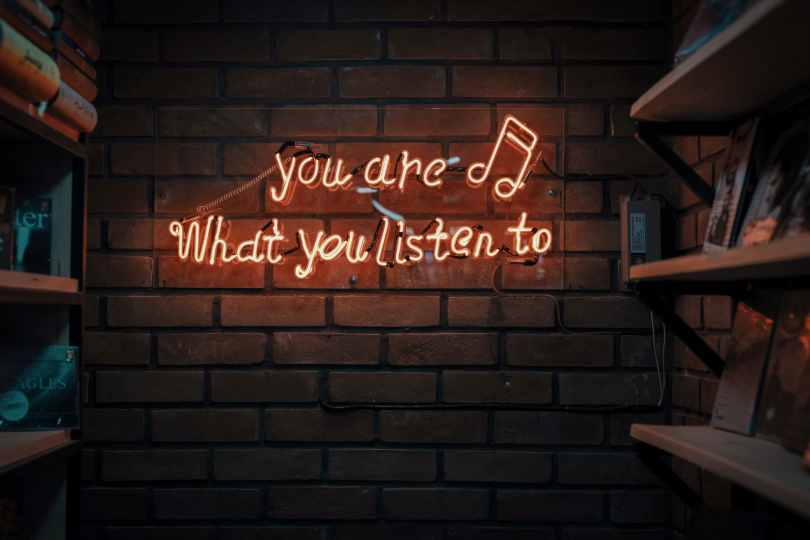
TOP 5 Reasons Why We're Obsessed with Music
Imagine that all devices that can play music suddenly disappear, along with all musical instruments, leaving no one able to reproduce or generate sound. Quite a scary vision, isn't it? Music has become an omnipresent and indispensable part of our daily lives. We consume it in gigantic quantities, spend thousands of hours listening to it, use it as a background for all sorts of activities – and millions of people try to create their own music by playing instruments, singing and performing. Let's take a look at the top 5 reasons why we are obsessed with music.
1. The question of survival
Scientists studying acoustics have discovered that music was an essential survival skill for early cavemen. They used singing as a sort of bat sonar system. It helped them navigate the eerily dark caves. The reflection of sound helped them know the location of other members of the group, dangerous animals or the nooks and crannies of unfamiliar terrain. It was our first GPS. Our ancestors (unfairly labelled "primitive") also had extremely sensitive hearing, which could identify the size of an animal, its location and, most importantly, its mood by its sound. A hungry animal made a different type of sound than a full, satisfied animal.
Vocal intonation is also an extremely important component of any language and can give words dramatically different content. For example, Czech usually uses a range of about a fifth, but an English speaker would sing "hello" in the octave range. In our ancestors' communication, it was very important how you "sang" your greeting, because that's how you knew whether you were a friend or an enemy. So, in the early days of mankind, musical talent could save you from being eaten by a bear, pierced by a spear while visiting neighbours, or lost in a dark cave. Pretty crucial skill, don't you think?
2. Brain training
For many years, the theory of the separate functions of the brain hemispheres prevailed among scientists. It was thought that the left hemisphere handles language, cognitive and analytical functions, while the right hemisphere handles abstract and creative skills (music, art, etc.). However, after many more scientific studies, it was discovered that the two hemispheres work together in many cases and often in reverse than originally thought. In short, your brain will use the hemispheres according to its needs and the situation.
Active listening to music engages all parts of the brain and activates complex functions that we had no idea about before. So if you want to connect your hemispheres and increase the capacity of your grey cortex, immerse yourself in listening to your favourite album or play an instrument. You'll be doing the very best for your mental development. And it's scientifically proven!
3. Identity
There is no need to quote scientific studies or to search for arguments in the wealth of literature written on the subject. Show me your Spotify playlist and I'll tell you what kind of person you are. Our personality determines the music we listen to. When I was a teenager going through the typical painful period of searching for identity and building my own personality, music was both an escape and a torch on the winding road to adulthood. I naturally became a fan of extreme metal genres.
Apart from the brutal riffs and vocals, I especially enjoyed the outraged reactions of the conservative environment (parents, school, neighbours, etc.). I knew what would happen when I put on a Cannibal Corpse sweatshirt and turned up the speakers playing Sepultura's latest opus. I felt special and at the same time belonged to an elite club of "metalheads", which was confirmed by an appreciative nod when meeting someone who felt the same way.
When you're fully into something, you develop an internal radar to recognise similarly-minded people. Later, when I started playing bass and became a member of my first band, this feeling of specialness became even more pronounced. The bass and the music defined who I was and where I belonged.
4. Cultural phenomenon
We may differ in lifestyle, population size, territory, wealth, religion, skin colour and a thousand other details that identify members of a particular tribe, nation or civilisation. But there is one thing we all have in common. Music is everywhere. It is a unique phenomenon that runs like a silver thread through all human communities. Some cultures create percussive music using different kinds of drums, wood or other materials. For them, rhythm is everything. Others prefer the human voice, while in other circles music is inseparable from dance.
Music may be associated only with certain rituals and formal ceremonies, or it might be omnipresent and form the soundtrack of everyday life. It is interesting how many different forms and shapes musical expression can take. There is no such thing as a universal formula that defines music. What is obvious to our Western European perspective (with our elaborate theoretical model) doesn't apply in Pacific cultures, on the African continent or in Asia, for example.
5. Mozart effect
Here I follow up on point number 3 regarding the superpowers of music to raise IQ. Decades ago, Dr. Gordon Shaw became famous for a popular scientific theory he attractively called the Mozart effect. It was based on a simple observation that listening to classical music raises your IQ. So pregnant mothers started placing boom boxes with a selection of classical repertoire on their bellies, public transport began to play Mozart, and students suddenly discovered J.S. Bach during their exam periods. In fact, Dr. Shaw claimed that listening to classical music can raise your IQ by up to nine points. It is, he said, as demanding a brain activity as playing chess, complex mathematical tasks, engineering and scientific operations. A miracle, isn't it?
However, Philip Ball in his wonderful book The Music Instinct proves that it is not so much a Mozart effect as a Music effect. In short, if you listen to any music you like and that inspires you, you will perform better not only in mathematics but also in history. Music can stimulate your brain in such complex patterns that nothing compares to it in this regard. And if the listener becomes a musician who plays himself, then this super ability increases many times more.
To conclude, I would like to say that our obsession with music is not just a trend or one of the attributes of mass pop culture. Music is essential to our healthy development, and the more music we have in our lives, the better for our brain, motor function, social and psychological skills, and most importantly, the communities we live in.
If you have found an error or typo in the article, please let us know by e-mail info@insounder.org.





